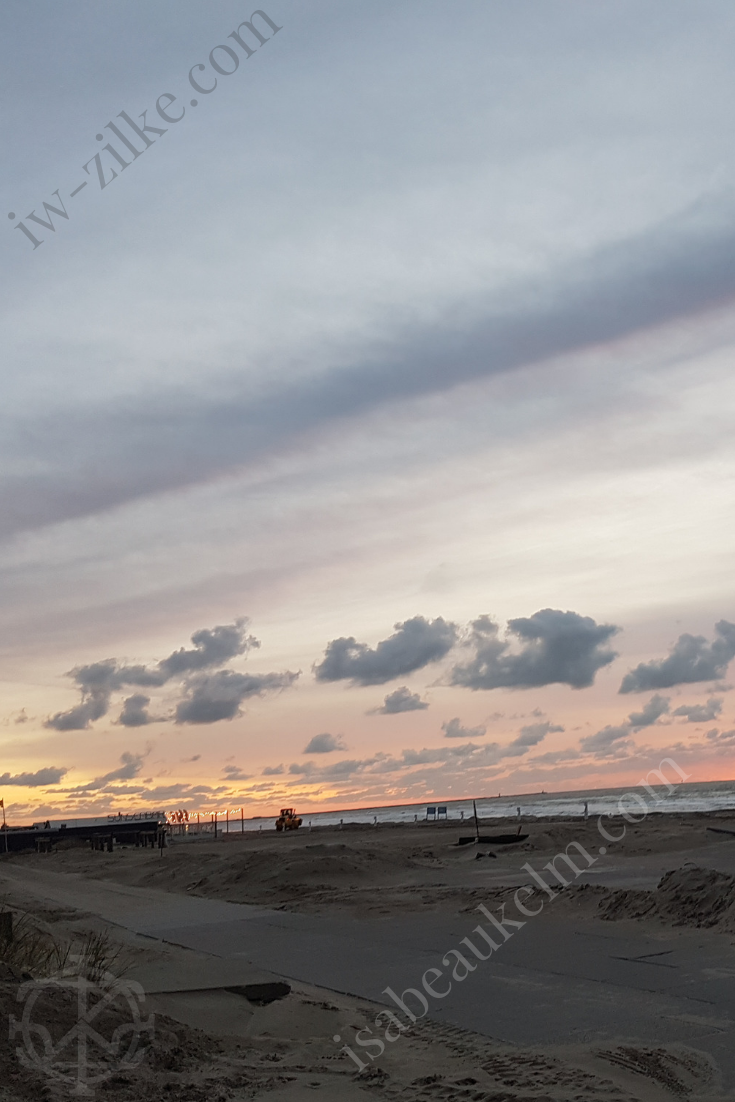An Ode to Gratitude - Eine Ode an die Dankbarkeit (The Paris Review)
- isabeaukelm
- 5. Nov. 2018
- 4 Min. Lesezeit

~Deutsche Version unten~
Once on a Monday evening I was walking along this beach situated at the North Sea. In front of me the explosion of colours of the dying sun. And I was grateful to see and to smell and to savour the moment.
A couple of days ago I have found a poem on gratitude in my inbox, sent by The Paris Review. Seeing the photograph of the sea sight that I have taken last year, I immediately associated this image with the following poem:
Gratitude by Robert Cording Issue no. 155 (Summer 2000)
In his prison letters, Bonhoeffer is thankful for a hairbrush, for a pipe and tobacco, for cigarettes and Schelling's Morals Vol. II. Thankful for stain remover, laxatives, collar studs, bottled fruit and cooling salts. For his Bible and hymns praising what is fearful, which he sings, pacing in circles for exercise, to his cell walls where he's hung a reproduction of Durer's Apocalypse. He's thankful for letters from his parents and friends that lead him back home, and for the pain of memory's arrival, his orderly room of books and prints too far from the nightly sobs of a prisoner in the next cell whom Bonhoeffer does not know how to comfort, though he believes religion begins with a neighbor who is within reach. He's thankful for the few hours outside in the prison yard, and for the half-strangled laughter between inmates as they sit together under a chestnut tree. He's thankful even for a small ant hill, and for the ants that are all purpose and clear decision. For the two lime trees that mumble audibly with the workings of bees in June and, especially, for the warm laying on of sun that tells him he's a man created of earth and not of air and thoughts. He's thankful for minutes when his reading and writing fill up the emptiness of time, and for those moments when he sees himself as a small figure in a vast, unrolling scroll. though mostly he looks out over the plains of ignorance inside himself. And for that, too, he's thankful: for the self who asks who am I?—the man who steps cheerfully from this cell and speaks easily, without hatred to his jailers, or the man who is restless and weary and trembling with anger and despair as cities burn and Jews are herded into railroad cars—can, without an answer, say finally, I am thine, to a God who lives each day, as Bonhoeffer must, in the knowledge of what has been done, is still being done, his gift a refusal to leave his suffering, for which, even as the rope is placed around his neck and pulled tight, Bonhoeffer is utterly grateful.
~
Einst an einem Montagabend bin ich entlang einen Strand an der Nordsee spazieren gegangen. Vor mir eine Farbenexplosion der sterbenden Sonne. Und ich war dankbar, diesen Moment zu sehen und zu riechen und erlebt haben zu dürfen.
Vor ein paar Tagen habe ich ein Gedicht über Dankbarkeit in meiner Inbox gefunden, die mir das Literaturmagazin The Paris Review geschickt hatte. Nachdem ich die Fotografie des Meeres wieder entdeckt hatte, die ich letztes Jahr gemacht habe, assoziierte ich sofort dieses Bild mit dem folgenden Gedicht (auf Englisch):
Gratitude by Robert Cording Issue no. 155 (Summer 2000)
In his prison letters, Bonhoeffer is thankful for a hairbrush, for a pipe and tobacco, for cigarettes and Schelling's Morals Vol. II. Thankful for stain remover, laxatives, collar studs, bottled fruit and cooling salts. For his Bible and hymns praising what is fearful, which he sings, pacing in circles for exercise, to his cell walls where he's hung a reproduction of Durer's Apocalypse. He's thankful for letters from his parents and friends that lead him back home, and for the pain of memory's arrival, his orderly room of books and prints too far from the nightly sobs of a prisoner in the next cell whom Bonhoeffer does not know how to comfort, though he believes religion begins with a neighbor who is within reach. He's thankful for the few hours outside in the prison yard, and for the half-strangled laughter between inmates as they sit together under a chestnut tree. He's thankful even for a small ant hill, and for the ants that are all purpose and clear decision. For the two lime trees that mumble audibly with the workings of bees in June and, especially, for the warm laying on of sun that tells him he's a man created of earth and not of air and thoughts. He's thankful for minutes when his reading and writing fill up the emptiness of time, and for those moments when he sees himself as a small figure in a vast, unrolling scroll. though mostly he looks out over the plains of ignorance inside himself. And for that, too, he's thankful: for the self who asks who am I?—the man who steps cheerfully from this cell and speaks easily, without hatred to his jailers, or the man who is restless and weary and trembling with anger and despair as cities burn and Jews are herded into railroad cars—can, without an answer, say finally, I am thine, to a God who lives each day, as Bonhoeffer must, in the knowledge of what has been done, is still being done, his gift a refusal to leave his suffering, for which, even as the rope is placed around his neck and pulled tight, Bonhoeffer is utterly grateful.



Kommentare